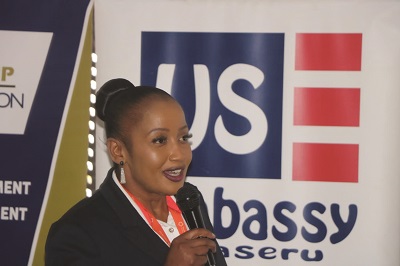By ‘Matsie Qhasane and Nthabiseng Ratalane
MASERU – The Revenue Service Lesotho was established by Act no. 14 of 2001 and became operational in 2003. Main body responsible for the assessment and collection, on behalf of the Government, of specified revenue; for the administration and enforcement of laws relating to such revenue and other related matters. The Service, which became operational in January 2003, incorporates the functions of the old Income Tax, Customs and Excise and Sales Tax Departments. The RSL was established to enhance the efficiency and effectiveness of revenue collection and to provide an improved service to the public. The Service is required to maintain the highest standards of financial integrity and corporate governance. Despite operating outside the framework of the Civil Service, the Authority is fully accountable to the Parliament.
RSL and BAM GROUP held a meeting at the State Library /American corner on 20th April 2023, Maseru. The purpose of the meeting was to give an understanding of the role of Revenue Service Lesotho within the business sphere and explain the different tax bases and rates, and why, how and by whom they are paid.
“Taxes are compulsory levies that are imposed by government on individuals and corporations in order to finance public spending, tax is paid by individuals and businesses”, Mrs. ‘Matlotliso Tlali said.
She indicated that the benefits of tax to the country is to finance public spending. It enables the government to provide services to the public. Once the tax is collected it form part of the government’s budget. The budget allocation of funds to various ministries within the Lesotho government comes from the total collected in tax.
RSL’s tax structure is as follows: income tax consists of payee, FBT, WHT and IIT, CIT, under VAT there is inland VAT and import VAT, and then under customs there is excise tax and customs duties. Therefore, income tax has multiple types which are; individual income tax- sole traders, partners in partnership, directors 10 percent or 20% and 30%, company income tax- 10% or 25%, pay as you earn- Employees(20% and 30%), fringe benefit tax-Employer (40%), and withholding tax-service providers (5% and 7.5%).
VAT and Customs Excise Act on importation of goods and services. Mrs. Mpho Ramapepe said declaration of goods and services is obligatory as per the Customs and Excise Act NO. 10 of 1982, this should be done irrespective of the value or nature of the goods carried across the borders. Section 14 (I). However, the threshold requirement for payment of import VAT is M250.00 and above, as stated in the RSL VAT ACT 2001 as amended.
Therefore, there is value added tax, tax levied on consumption of taxable goods and services, destination based rates (0% and 15%) and customs duties. Customs duties is the tax type imposed on imports and exports based on their origin and the rates are per the SACU tariff book.
RSL Rates are direct and indirect importation of goods or services. Direct importation is where by goods are imported at zero rate tax and being delivered by the supplier to the importers premises. The expectation with direct consignment or import is to pay VAT at the country of destination, direct supplies are delivered by the supplier, and applicable payment methods are cash or deferment account. However, indirect importation is whereby goods are imported through the border using the tax invoice as method of payment, the expectation with indirect import goods, is that goods are being delivered or collected with the expense of the importer, the importer must be registered for exporters codes with SARS or a nominated registered agent for declaration at SARS.
RSL Valid Tax Invoice Requirements are as follows, it must be an original tax invoice clearly written the word “Tax invoice”, it must indicate the calculated VAT at the standard rate of 15%, it must indicate the VAT registration number of a supplier with 14 digits starting with 4.
Tobacco and Alcohol Levy, Levy charged on tobacco and alcohol products, rates applicable: Tobacco products 30%, Alcohol products 15%.
For registration documents required: registration form-online, certified traders license, national identity document(ID), certificate of incorporation (CIT), Partnership Deed (partnership), P16/tax certificate, salary printout, pay slips. (Employees).
Declare all sources of income, gross income, employment income, business income, property income and other income/ gains. Filling process, use interim e-filing-visit RSL website:www.rsl.org.ls.
Payments are done online or electronic payments are provided by the following commercial banks: Standard Lesotho Bank, First National Bank and Nedbank Lesotho. Therefore, proof of payment should be send to receipts@rsl.org.ls


